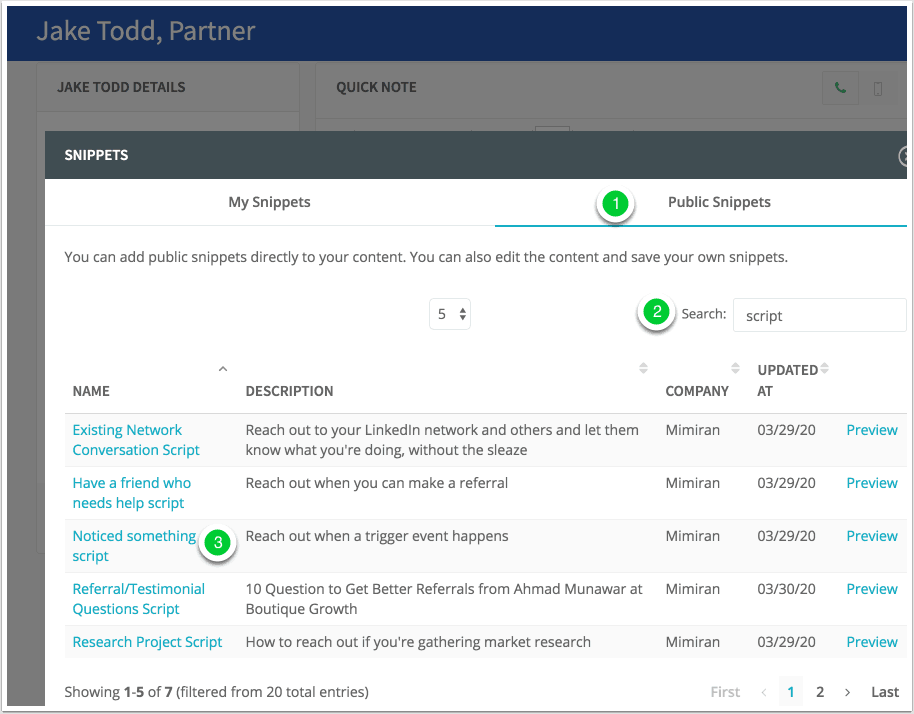Call scripts get a bad rap, because they can be terrible, especially if you use them wrong. But call scripts can be really useful to:
- Give you a game plan for a call, instead of struggling over what to say.
- Make sure you don’t miss an important point during a call.
- Provide training and consistency for your team.
As you get more comfortable, the scripts become less important. Consider a beginner, say at basketball. The coach diagrams a play and gives detailed instruction to everyone on where to start, where to move, and so on. As the players progress, the coach doesn’t have to give as much feedback– only noting a couple of times someone wasn’t in the right place, or perhaps did a particularly good job. And then when you have really experienced players, they may go “off script” during they play, because they can read the game as it unfolds and don’t have to be handcuffed to the play. But if the team didn’t have some plays to start, they would get run off the court by an opposing team that did.
Call scripts are like that, too. They are plays that you can practice and refine until they become natural and authentic for you. Magic and Bird could both run the fast break, but they each did it in their own way.
Calls scripts have some negatives, though.
Sounding like a robot
First, if you just read off the script, you sound like a person reading a script, instead of someone having a conversation.
To avoid this, practice reading the scripts out loud to get the rhythm and cadences. Edit as appropriate to put it in your voice.
Then when you make your calls, don’t just read off your script. It’s OK to have it within sight if you need to refer to it, but it should just be a map for if you get lost. If you were meeting someone face-to-face, you wouldn’t put your head in your notes and read your script. Don’t do it over the phone or video call, either.
Scripts Sound So Sales-y
The real problem with most sales scripts is that they are written for sales teams with a bunch of people who are considered interchangeable cogs.
Note that this doesn’t mean they’re wrong or bad for that particular situation. If you have a 100 or 1,000 reps selling insurance or whatever, the model is to have a system that lets you hire, train, and advance people in bulk.
If you have a tiny sales team, or you and your partners do all the sales, or you don’t even have any partners and you do all the selling yourself, this approach may not work for you. For one thing, it doesn’t sound like you at all. For another, you probably have enough people in your network that you already know to support a lot of business– the kind of people who don’t want to get a cheesy scripted call.
So think of the call scripts as ways to start a meaningful conversation. That’s it. Some of these conversations will lead to money, but that’s not the point of most of them, until you get into a sales cycle. (And when you do, there’s a script for that, don’t worry.)
Get Call Scripts for Non-Sales-y People
Now you can access a set of sales call scripts in Mimiran, right from your contact page where you enter your conversation notes (including a great one courtesy of David A. Fields, author of The Irresistible Consultant’s Guide to Winning Clients and Sales for Nerds guest). Do you can drop in a script to help guide your conversation.
Just click the Snippet icon in the toolbar, click on the Public Snippets tab (1), and search for “script” (2). Then insert the script you want by clicking on it (3).

Of course, what you really want to do is go the the Content Snippets page and check out the scripts before your start calling. Then just copy and paste into your own Snippets and make the adjustments you need to make it authentic for you.
These scripts are designed for consultants, lawyers, and other experts who are more into client service than sales. The goal is to foster meaningful discussion, not hard sell.
Don’t use Mimiran for CRM? (Why not start your free trial?) That’s fine, you can get all these call scripts here for free:
Don’t be like this encounter I had with a cold caller:
As E.M. Forster wrote in Howards End: “Only connect!”
